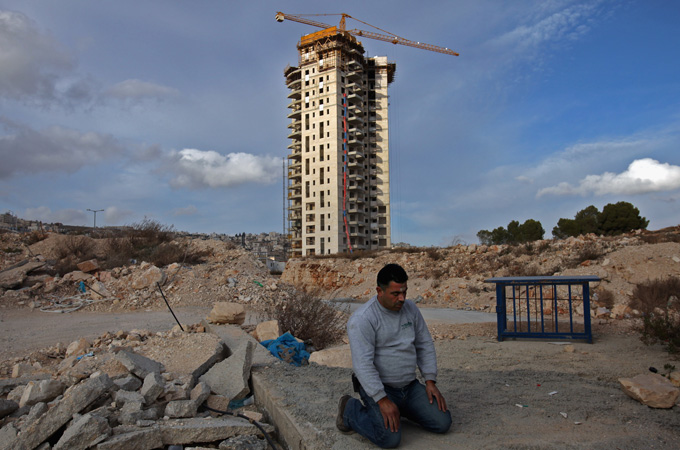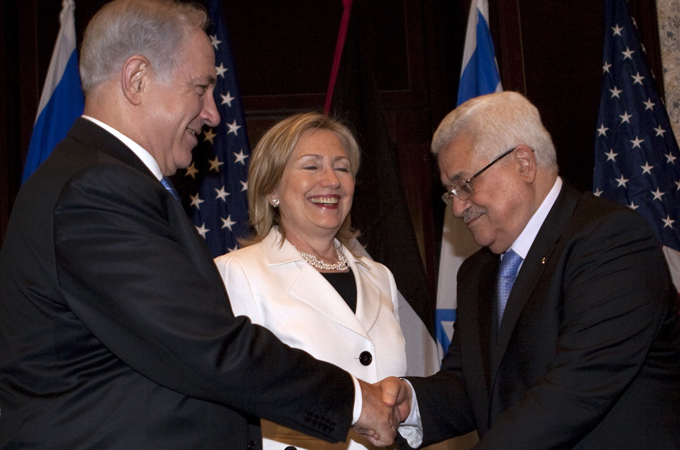EU shelves recognition of Palestine
Foreign ministers from European Union say they will recognise a Palestinian state “when appropriate”.

 |
| Palestinians fear Jewish settlement expansion on land where they aim to found their state will render that goal impossible [GALLO/GETTY] |
Foreign ministers from the European Union have said they would recognise a Palestinian state “when appropriate”.
The ministers’ declaration on Monday followed a call from Mahmoud Abbas, the president of the Palestinian Authority, for the EU to recognise Palestine based on the 1967 borders.
Israel occupied the West Bank and the Gaza Strip during the 1967 war. It withdrew its troops from Gaza in 2005.
The EU foreign affairs council “reiterates its readiness, when appropriate, to recognise a Palestinian state”, the European foreign ministers’ said in a statement.
“Urgent progress is needed towards a two state solution to the Israeli-Palestinian conflict.” The ministers said.
Stalled talks
They also “noted with regret” Israel’s failure to extend a moratorium on construction of Jewish settlements.
|
“In the days ahead our discussion with both sides will be substantive two-way conversations, with an eye toward making real progress” George Mitchell, |
“Our views on settlements, including in East Jerusalem, are clear: they are illegal under international law and an obstacle to peace.” The statement said.
Argentina and Brazilhave recently joined the growing number of countries to recognise Palestine, a move that Israel described as “highly regrettable” in the face of stalled peace talks.
Despite the collapse of direct Israeli-Palestinian talks, the US Middle East peace envoy said he would strive to achieve “real progress” in the coming months.
Launching the first round of shuttle diplomacy since negotiations hit an impasse over Jewish settlement building, George Mitchell met Binyamin Netanyahu, the Israeli prime minister, at his office in Jerusalem on Monday.
“In the days ahead our discussion with both sides will be substantive two-way conversations, with an eye toward making real progress in the next few months on the key questions of an eventual framework agreement,” Mitchell said as talks began.
Mitchell shuttled between Israeli and Palestinian leaders for months before direct talks began in September. They broke down weeks later when Netanyahu refused to extend a 10-month
freeze on housing starts in settlements in the occupied West Bank.
Earlier this month, Washington formally abandoned efforts to persuade Israel to agree to a partial renewal of the settlement moratorium in exchange for security guarantees.
‘Framework agreement’
Netanyahu praised Washington’s move, telling a business forum in Tel Aviv on Monday: “I welcome this American decision. It is good for Israel. It is good for peace.”
Standing beside Mitchell later in Jerusalem, Netanyahu said the goal was now “a new path, to achieve a common goal which is to get a framework agreement for peace that will ensure both peace and security.”
 |
| Direct talks aimed at finding a solution to the Israeli-Palestinian conflict collapsed in late September [AFP] |
Mitchell will hold separate talks with Abbas on Tuesday in the occupied West Bank.
Hillary Clinton, the US secretary of state, announced on Friday the United States would refocus efforts on a return to indirect talks and would push to resolve core issues in the six-decade conflict.
These include borders, security, the future of Jerusalem and settlements in territory Israel occupied in the 1967 Middle East War, and the fate of Palestinian refugees.
Palestinian officials, who have been highly critical of the US policy shift, said the seriousness of any diplomacy would depend on a halt to settlement building and setting out clear terms of reference.
Palestinian officials fear settlement expansion on land where they aim to establish their future state will make statehood impossible, and have voiced concern Israel may try to avoid discussion of their future state borders.
The Palestine Liberation Organisation’s executive committee met on Monday and said Israel’s policy “threatened the stability of the region” and showed its priorities were “settlement, expansion and perpetuating the occupation”.